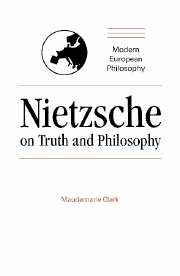Book contents
- Frontmatter
- Contents
- Preface
- Note on texts and citations
- Chapter 1 Interpreting Nietzsche on truth
- Chapter 2 Nietzsche and theories of truth
- Chapter 3 Language and truth: Nietzsche's early denial of truth
- Chapter 4 The development of Nietzsche's later position on truth
- Chapter 5 Perspectivism
- Chapter 6 The ascetic ideal
- Chapter 7 The will to power
- Chapter 8 Eternal recurrence
- Bibliography
- Index
Chapter 4 - The development of Nietzsche's later position on truth
Published online by Cambridge University Press: 04 December 2009
- Frontmatter
- Contents
- Preface
- Note on texts and citations
- Chapter 1 Interpreting Nietzsche on truth
- Chapter 2 Nietzsche and theories of truth
- Chapter 3 Language and truth: Nietzsche's early denial of truth
- Chapter 4 The development of Nietzsche's later position on truth
- Chapter 5 Perspectivism
- Chapter 6 The ascetic ideal
- Chapter 7 The will to power
- Chapter 8 Eternal recurrence
- Bibliography
- Index
Summary
This chapter provides evidence that Nietzsche's later works overcome TL's denial of truth. In these works, Nietzsche was able to adopt unambiguously the neo-Kantian position of TL – the rejection of transcendent or metaphysical truth as a contradiction in terms – because he rejected as contradictory the very idea of a thing-in-itself. He thereby lost all basis for denying truth, or for its equivalent, the thesis that human knowledge falsifies reality. I will offer this reasoning as the best explanation for the absence of the falsification thesis in Nietzsche's last six books. Although Nietzsche himself initially failed to appreciate this implication of his neo-Kantian position, there is evidence that he later recognized this failure, and my interpretation offers a way of explaining why it occurred.
The rejection of the thing-in-itself
Human, All-Too-Human (1878) already differs significantly from TL. The latter's denial of truth shared with BT the aim of devaluing the truths accessible through science and common sense and establishing the cognitive superiority of art. Nietzsche completely repudiates this aim in HA. He now regards it as the mark of a higher culture to value “the little unpretentious truths” won by strict or scientific method more highly than “the beautifying and brilliant errors” of metaphysical and artistic ages (HA 3).
- Type
- Chapter
- Information
- Nietzsche on Truth and Philosophy , pp. 95 - 126Publisher: Cambridge University PressPrint publication year: 1991



